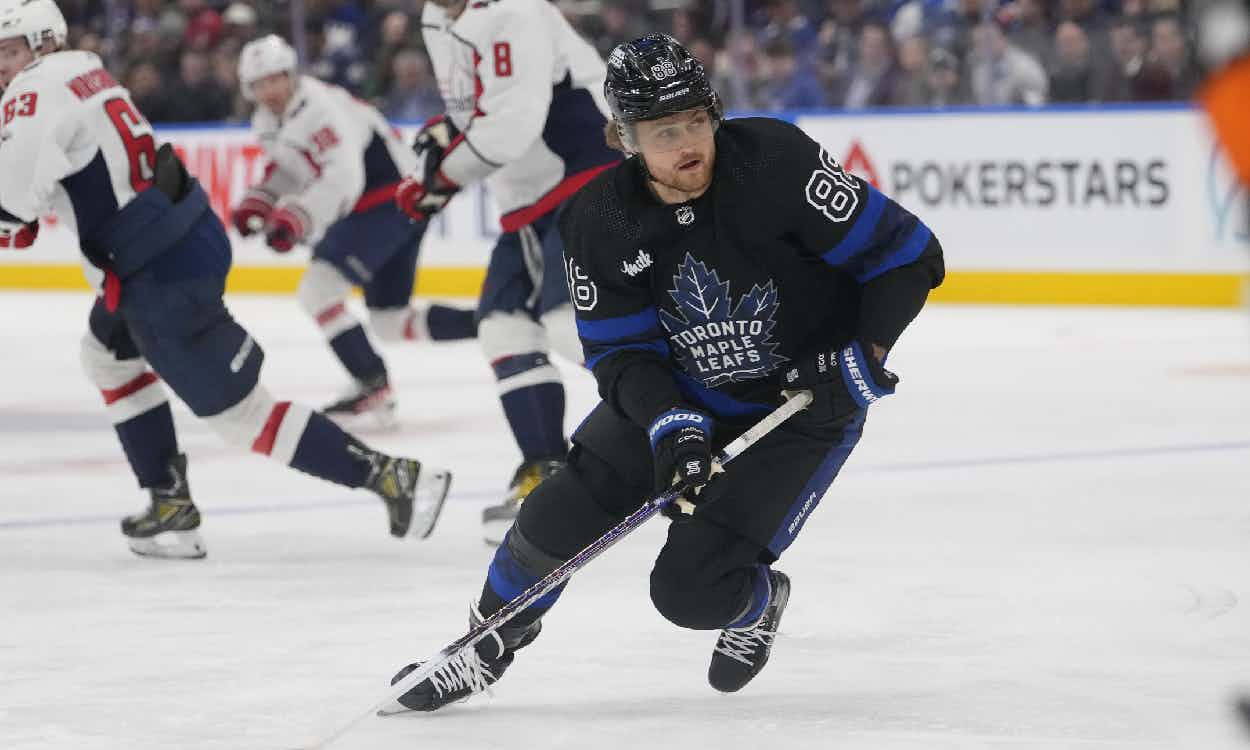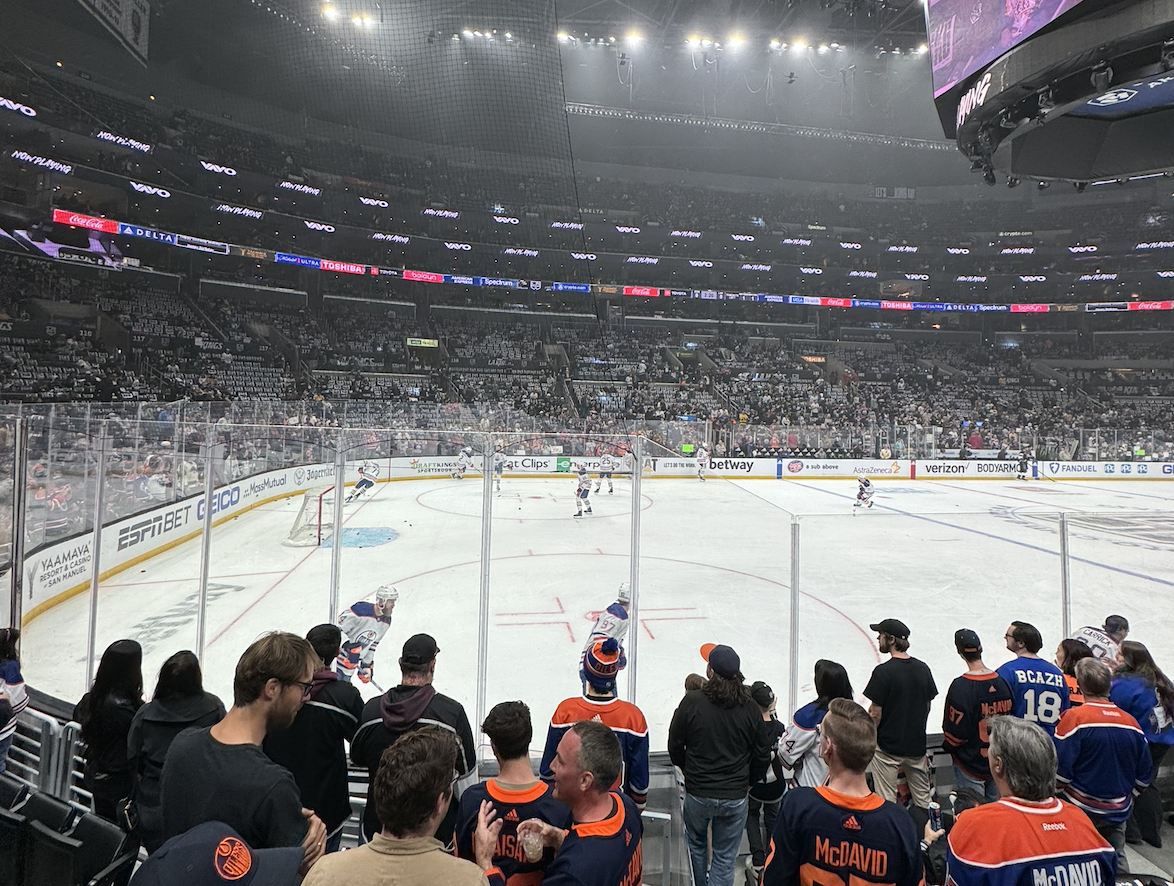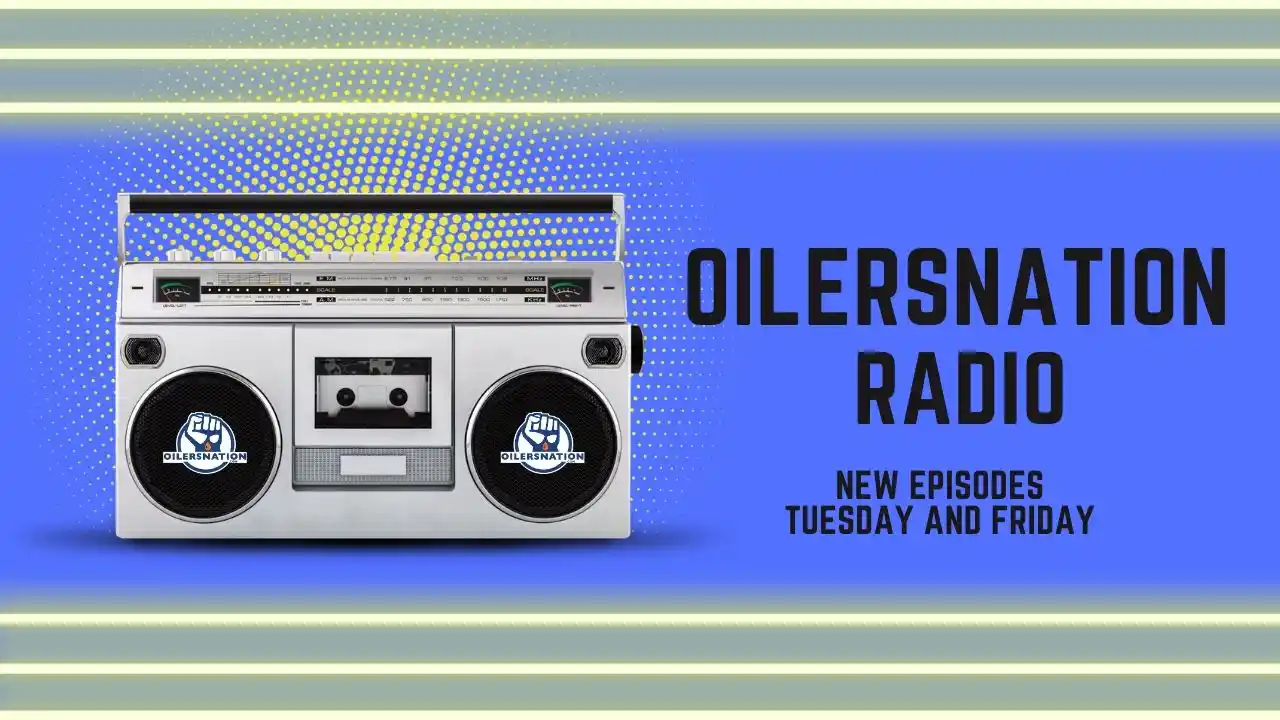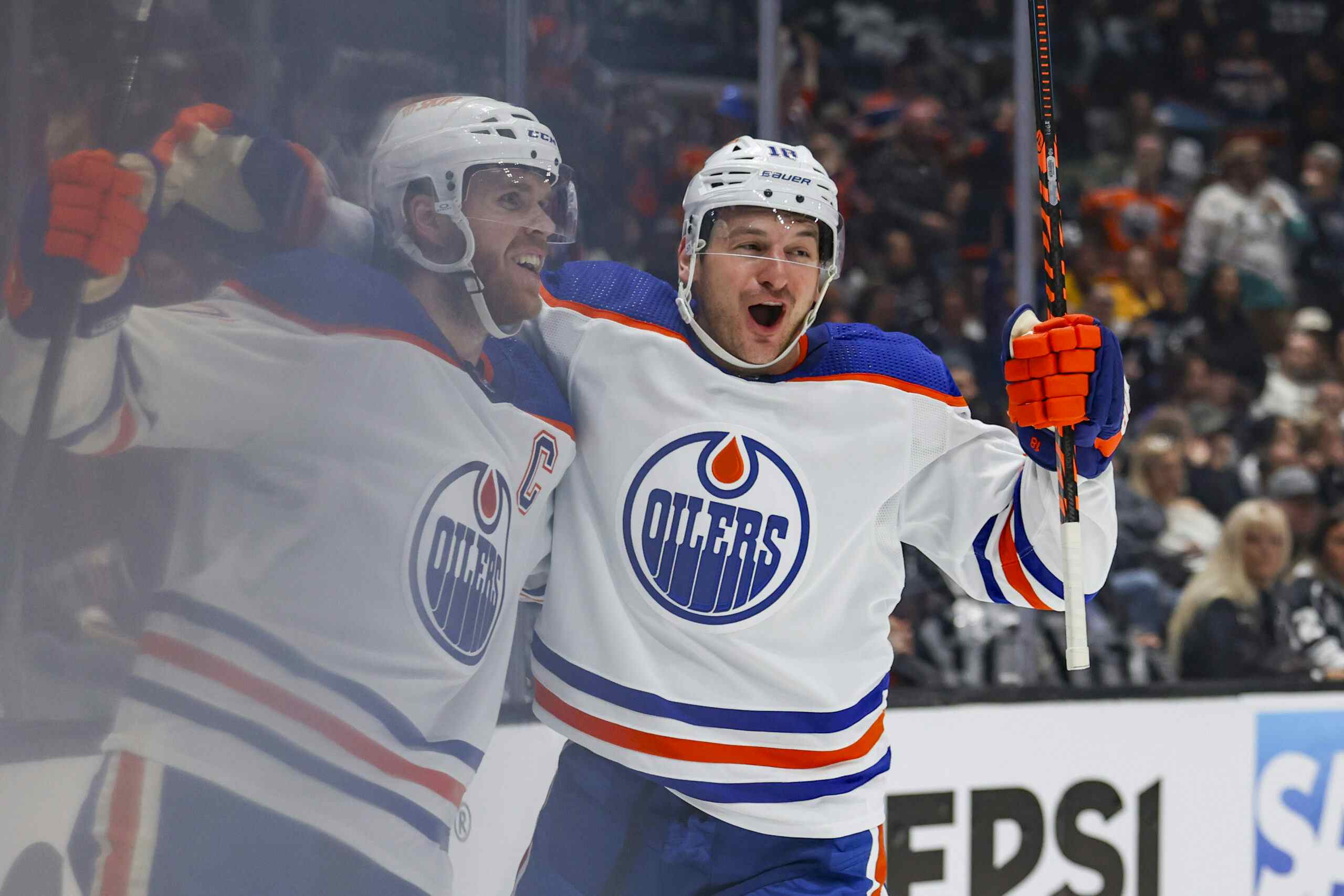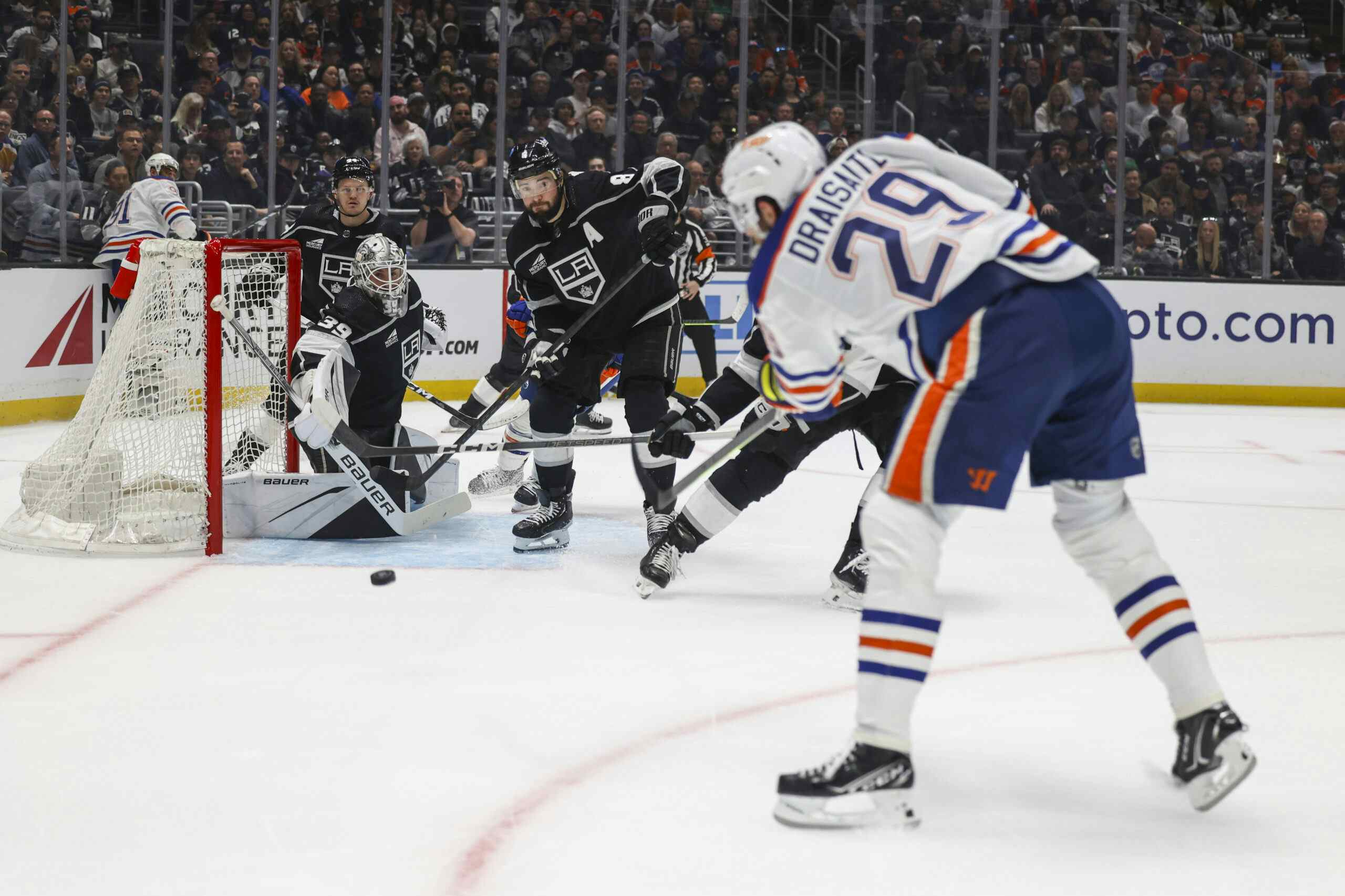Pat Quinn By Quotes
University-educated (he holds degrees in law and economics) Coach Pat Quinn was asked numerous questions about his coaching style during the 2002 Eastern Conference Final. The questions and answers are recorded for us via the magic of ASAPSports, and in the absence of actual off-season movement may be of interest to Oilers fans. Also of some interest is the excellent Stromboulopoulos interview above.
I’ve snagged a few exchanges that intrigued me the most, starting with the ASAP Sports information and than moving to the Stromboulopoulos interview.
Q. How much has the style of play changed having to accommodate a different lineup than having all of your guys healthy?
COACH QUINN: Not a lot. We have, roughly, a system, a style of play. I’ve always liked to believe that I am not a demander; that you must be at Place X at a certain time. The system won’t control us. I’d like to think I allow the players to control their system. So when players come in, they have some freedoms. Less defensively when we lose the puck; maybe that’s why we’ve had some trouble because guys might confuse that freedom from offense to defense and think that they could have it all the time. But we are supposed to be a little more disciplined within our system of play and rely on others to do certain things at certain times when we don’t have the puck as for when we have the puck than when we do have the puck. Primarily we have not changed very much. I might have done a little line matching a little bit that I don’t do during the regular season, but philosophically, we have taken the same approach.
A few points (and feel free to add others in the comments):
- Quinn did emphasize a system with the Maple Leafs; however, that system was flexible and allowed room for offensive creativity.
- That said, this wasn’t some loosy-goosey stand-at-the-opposition-blueline system; players had defensive responsibilities and Quinn – like every other NHL coach – had requirements of his players, especially in their own end.
- Line matching, as has been noted on this site before (by Jason Gregor in particular) is not something Quinn is dogmatic about, although he isn’t exactly averse to using it on occasion either.
- I think Quinn comes across well here; he allows individual creativity offensively but has a more structured setup defensively and on the surface that just sounds like a good combination. In practice, Quinn’s Leafs weren’t always responsible without the puck (something that he notes above) but if it results in enough offense that’s a trade-off worth making.
Q. Your perspective on a couple of these games has been a little bit different. Do you see anything different from the bench, seeing a guy like Bryan McCabe, just your impressions of how he’s evolved?
COACH QUINN: We watch the TVs a second and third time. When you are behind the bench you watch it for the first time from there, and then you see it again and again. All I did there was avoid or miss watching it from behind the bench. I’ve seen it from that angle a lot. And no, it doesn’t show you anything different, except that the TV commentators and the analysts pick up on some things that are sometimes insightful, and sometimes they create stuff that doesn’t mean anything. They are trying to put a story out there, too.
Again, my thoughts:
- Quinn reviews game tapes. That’s hardly exceptional among NHL coaches, but the one thing that I do like is his humility; he acknowledges getting insights from some of the TV commentators.
- Of course the other thing Quinn (fairly) points out is that commentators are often trying to create a narrative, and sometimes the things they focus on aren’t particularly useful.
Q. Losing at home in Game 4, winning on the road in Game 5, can you take the temperature of your team?
COACH QUINN: We’ve been around long enough to know that you can play better than a team on the other side in a lot of areas and lose the hockey game; that they may be sitting there feeling the same thing after Game 5 down there. Game 4 is probably statistically, territorially, chance-wise, probably a game we should have won. Didn’t happen. But that’s all stuff that we can’t control anymore. The only thing we can try and do is control ourselves to be ready enough to play tomorrow night. And in control, not just control ourselves. We need to be playing on that right edge for us to be successful.
- I’d be remiss if I didn’t mention Corsi here. People tend to forget that most of the stats used around the internet were either inspired or created by NHL coaches. Whether Pat Quinn is referring to that specific statistic or not, he does talk about the territorial advantage his team had – exactly what Corsi strives to measure. The simple fact of the matter is that teams who play more in the opposition end generally win more games.
- Quinn also talks about scoring chances – something that he mentions from time to time and quite clearly keeps track of. This past winter Dennis (an occasional commenter here) tracked scoring chances for all Oilers games, and the final tally for every player is posted here. It’s useful stuff, and unsurprisingly says a lot of the same things that Corsi does.
Q. You talked earlier about not creating enough room for yourself, and only scoring six goals in the series, is that more of a comment on the style of hockey in the playoffs, or do you look at it and say, not enough skill?
COACH QUINN: I think a lot of it has to do — you know what, you can beat any style, if you get your guys sticking with it. One of our problems is when you get to the playoffs and you want to change to beat a style, you don’t have the practice time. Your guys are so hurt you can’t get on the ice. So you can’t change things. You might talk on the chalkboard, but this game is one of the games that it takes time to get used to a change, like a golf swing or whatever it is. When you’re changing your system, it’s not just drawing on the board, you have to have guys practice through it so it becomes second nature so they are not standing out there thinking what am I supposed to do now, where am I supposed to do, what did the coach say this morning. That’s the worst part before about the playoffs. That’s why you try to change things through the season so your team might have that adaptability I think when it’s necessary to have it. All these guys did, very much the same as we played in the other series, they were less aggressive to put pressure on us, but we didn’t handle it as well as we did the other two series. So, a lot of it was us. It was frustrating, and as I said, half of their job of checking us was done by us; and in that, we often stood up where we were easily checkable, we were stand-still especially on the wings, a stand-still hockey club. And that’s what that style they use forces you to do, stand still. It’s the trap, or the 1-2-2 is a stand-still style of play. It still works. Obviously it works. It beat us. Jersey has won two Cups using it. Dallas who will bore to you death has won a Cup. It’s good stuff. We try to use it, except we have not got the discipline to stick with it sometimes. But, there’s ways to break it. We just could not seem to stick with it. We had periods of it. Start of our game tonight was good. Start of the overtime was good. We got a lot of room then, but we had to create it. We got back and used it, the defense. Your defense, you really have to skate, that’s really a key. So, it’s not just talent. I’ve always felt our team is a pretty skilled team. You guys don’t need a course on hockey. There’s reason to celebrate someplace, but not for me.
That quote came right after the series loss to Carolina. It’s interesting for a lot of reasons, but in particular I keyed in on the following:
- Pat Quinn is not foolish enough to believe that defensive hockey doesn’t win games. He’s used the 1-2-2 (or if you prefer, the trap) at times and strongly believes in ingrained versatility.
- The point about practices in the playoffs is a good one. Fine-tuning may be possible, but the game plan already needs to exist, and players must already have the needed knowledge to execute a variety of systems.
- Quinn talks about beating the trap, and he’s absolutely right that there are ways to do it, but playing against a strong system requires forethought and an offensive system that can get through the neutral zone.
- Quinn’s going to love the blue-line he’s inherited. He has three legitimate speedsters on the back end (in Visnovsky, Gilbert and Grebeshkov) and combination is actually more mobile than the team he had in 2002. It’s also worth noting that Pat Quinn had good success with Bryan McCabe in Toronto, and that Sheldon Souray shares some basic stylistic points with McCabe (although I believe Souray to be the better player).
Q: Do you ever send a guy out there to beat somebody up… how does a coach handle that?
COACH QUINN: I’ve never liked that. I’ve always said, in my mind, I’ll keep you on the bench if you learn how to play – I won’t keep you on the bench – but you’ll be a part of my team if you can learn how to play.
Q: You had Tie Domi right, who a lot of people thought was a goon…
COACH QUINN: The first thing I said to Tie when I came to Toronto was ‘Tie, I know you’re a tough guy and a fighter – if you learn how to play and show me you can play hockey then you can stay on the Toronto team. But if you’re just going to put on a show and go out there every once in a while, then I don’t want you.’
Two simple points:
- I completely agree. I’m not a fan of the designated goon; if a player can’t take a regular shift on the fourth line he doesn’t belong on the bench.
- Steve MacIntyre’s days with this team aren’t necessarily numbered, but it would take a miracle at this point for him to turn into a regular fourth line player. I don’t think he makes the opening night roster.
Finally – and it’s a bit of a side point – the explanation of Quinn’s history with Bobby Orr towards the interview is great stuff. The next time some old-timer talks about how all the visor-wearing stick-work types are destroying the game and how all the players in previous era respected each other, remember Quinn talking about getting kicked in the gut by Bobby Orr. The game is, if anything, cleaner now than it has been at any point since the NHL’s inception.
Recent articles from Jonathan Willis

